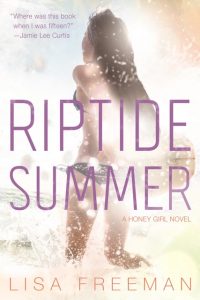When I finished Honey Girl, I was eager to dive into the sequel–mostly because I was absorbed by the setting (1972 Californian beach culture), but also because Riptide Summer promised to break the rule that “Girls don’t surf.” I’m glad that I got see more of Nani and her life, but overall I didn’t enjoy this one as much as the first book. I don’t feel like I have a lot to say about this book that is different from the first book, just a few thoughts:
[Spoilers]
- It’s not surprising that Nani’s relationship with Rox fell apart. I was rooting for them, but it was despite the obvious instability in their arrangement. It was disappointing, but not unrealistic, for them to so quickly turn on each other.
- I felt like the characterization wasn’t as strong in this volume–Claire, for instance, is barely present, and I completely forgot her personality.
- I did like that Nani started surfing, but it wasn’t until halfway through the book, and in secret. I would want to see more of her after the secret came out, and how she dealt with this new side of beach culture.
- My favourite part of the whole book was Windy, the new love interest, and we barely get to see her at all! If there is another sequel that focuses on them and Nani’s new surf life, I would pick that up.
- I wasn’t sure from the last book whether Nani was bi or gay, but despite wanting to kiss and date guys, she seems to decide that she’s a lesbian by the end, because she enjoys sex with women more. Unfortunately, this is also wrapped in a lot of biphobia: she tells Rox that she’s a lesbian, no matter what she says, and says she doesn’t want to be one of those funny kine girls who also date guys. The idea that someone can be attracted to more than one gender and that’s fine doesn’t really come up at all.
[End spoilers]
This series felt a little fractured, actually, like they were originally supposed to be one story and then were separated into two volumes. Riptide Summer didn’t seem to have its own arc; it just followed along where Honey Girl left off. I wish this had been condensed in some way, whether that was making Honey Girl and Riptide Summer one book, or skipping over a lot of Riptide Summer and getting more into the surfing plot line and the romance with Windy.


